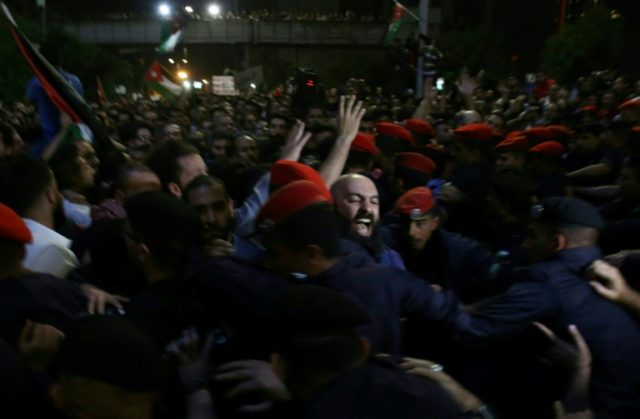Jordan’s King Abdullah II on Monday replaced the kingdom’s embattled prime minister to appease the biggest anti-government demonstrations in the country since 2011.
The king of Jordan, who holds ultimate power over all policy issues, is known for disbanding governments to manage political crises.
King Abdullah replaced Prime Minister Hani Mulki with Omar al-Razzaz, a former World Bank economist, to appease protests raging since last Wednesday over International Monetary Fund (IMF)-backed tax hikes that have explicitly affected the less fortunate.
“Thousands have filled the streets of the kingdom in recent days to protest planned tax increases and have called for the resignation of Prime Minister Hani Mulki. … It’s unclear if his departure would suffice to defuse growing public anger over a series of austerity measures,” the Associated Press (AP) reports.
“While some celebrated the change of government, the head of the Professional Unions Association said a strike planned for Wednesday would go ahead unless the draft income tax law was withdrawn,” Reuters adds.
Jordanians have taken to the streets of the country’s capital an several other cities to protest an IMF-backed draft income tax law and price hikes.
“Public anger has grown over government policies since a steep general sales tax hike earlier this year and the abolition of bread subsidies, both measures driven by the International Monetary Fund,” Reuters notes, adding:
Government plans to lift taxes have brought thousands of people onto the streets in the capital Amman and other parts of Jordan since last week, shaking a U.S.-allied Arab country that has remained stable through years of regional turmoil.
King Abdullah appointed Omar al-Razzaz, a former World Bank economist, to form the new government after accepting Hani Mulki’s resignation, a ministerial source said.
Jordan’s state-owned Petra news agency indicated that the country’s lawmakers might revoke the tax hikes, noting that the speaker of parliament has asked the king for permission to hold a session to shelve the measure, according to Reuters.
In a letter accepting the Mulki’s resignation, the king reportedly praised the former PM for “bravely taking difficult decisions that were not popular but were in the higher interest of the nation” and urged him to help the new government through the transition process.
So far, Jordanian authorities have arrested 60 protesters for “breaking the law,” Reuters reports, adding that the demonstrations have also injured 42 security force officers.
Nevertheless, Maj. Gen. Hussein Hawatmeh, the chief of the Gendarmerie security department, reportedly declared, “Rest assured, Jordan is a safe and secure country, and things are under control.”
“Jordan, which has a peace treaty with Israel, has navigated years of instability at its borders, including wars in Iraq and Syria and conflict in the Israeli-occupied West Bank,” Reuters acknowledges.
Further depleting Jordan’s already poor in resources, the country hosts hundreds of thousands of Syrian refugees.

COMMENTS
Please let us know if you're having issues with commenting.